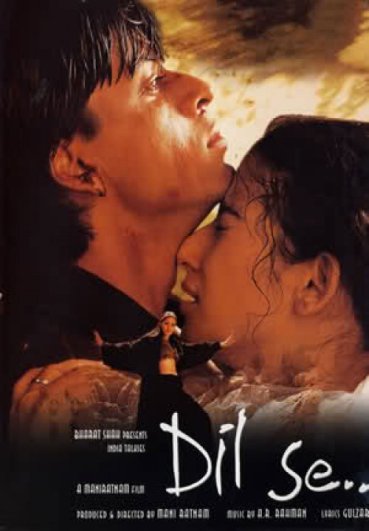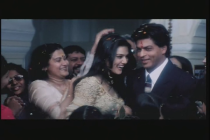
Dil Se is the third film in Mani Ratnam’s terrorist trilogy following on from Roja and Bombay. This was actually the first of these that I watched, mainly due to the presence of Shah Rukh Khan who was the major draw for me at the time, but also because the film is in Hindi, which I was trying to learn. It’s remained one of my favourite Mani Ratnam movies though and I find it hard to believe that it’s now 20 years since its release in 1998. I love this film for so many reasons, the amazing music, wonderful choreography and stunning scenery but also because the story grabs hold and remains captivating – every single time. Dil Se wasn’t a hit in India, despite winning awards at festivals and doing well in the USA and UK, but it now has a deservedly classic status and is well worth watching or revisiting if you haven’t seen it for a while.
Dil Se is the story of a Dehli-based radio journalist who falls in love with a mysterious woman he sees on a deserted railway platform one night. Amar (Shah Rukh Khan) describes it as “the shortest love story ever” when she leaves on the next train after sending him off to get a cup of hot tea. What I love here is the contrast between them, even in these first few minutes. She doesn’t say a word except for ‘a cup of hot tea’ while Amar never stops talking. It’s an early clue that these two aren’t likely partners but also raises questions about why Amar becomes just so obsessed by this woman based on this one brief meeting.
Amar’s assignment for All India Radio takes him to the north of the country where insurgents have been engaged in terrorist activity and Amar wants to speak to them as well as garner regional thoughts on the 50thAnniversary of Indian Independence. When he does finally reach his destination, after the wonderful Chaiyya Chaiyya on the train, he spots the same woman in the crowd and immediately runs after her. While Meghna (Manisha Koirala) is perfectly plain that she wants absolutely nothing to do with him, Amar refuses to take no for an answer and pesters her persistently until her friends take matters into their own hands and beat him up.
This starts out as the usual stalking = love trope seen in so many Indian films. It is really annoying that Amar fails to take no for an answer and is completely relentless in his pursuit. What I do like though is that Meghna is brutally clear, trying everything from ignoring Amar, to telling him that she is married, just to get away from him. All my sympathies are with her at this point, and I really don’t like Amar who just seems to be selfish and frankly obnoxious. But this seems more than just stalking. Amar is completely obsessed with this girl who won’t even give him her name and even the beating fails to dampen his desire.
Amar follows Meghna on a bus, walking with her when the bus breaks down and even attempting to force her to kiss him. Meghna has a panic attack at this point and hints that she has had experiences in the past that may have contributed to her determined refusal of Amar. She also continually tells him that she isn’t what he thinks she is, and finally we learn that she is part of the terrorist organisation. Manisha Koirala is completely amazing here. She appears ethereal and wraith-like, as if a strong gust of wind would blow her away, but also shows such incredible mental strength demonstrated by her continual refusal to yield to Amar. It’s clear as the story develops that she does have feeling for him, but her allegiance to her cause is deeper, possibly just more entrenched, and her emotional turmoil fleetingly moves across her face each time she has to interact with Amar. It’s a brilliant performance, particularly in the scenes where she reveals what has happened to her and tries to explain to Amar why she has turned to terrorism.
Gradually rapport develops between the couple, but Amar is left devastated when Meghna leaves him during the night and he ends up returning to Delhi alone to prepare for his upcoming wedding to Preeti (Preity Zinta). Preita is wonderful here in her début role portraying a confidently independent but still innocent girl from Kerala. Ok, the Malayali bit is a tad strange, but the rest is brilliant! I love how she refers to sex as “honka bonka bonks”, and her directness is refreshing after all the mystery and secrets surrounding Meghna. She also gets a cool song in Jiya Jale, which has some of my favourite picturisations in the whole film.
I’ve read a number of times that the film depicts the seven stages of love from Arabic literature comprising attraction, infatuation, love, reverence, worship, obsession and death. Using this theme, Amar’s obsession makes more sense and it helps to explain why he continually follows Meghna despite her apparent disinterest. There is the moment of attraction when he glimpses her face on the railway station. Infatuation where he sees her everywhere and thinks about the mystery woman before this deepens into love. Reverence and worship are pretty much covered in Satrangi Re where Meghna appears in all seven colours of the song. Like most of the songs this seems to be another fantasy sequence, although it’s not clear if this is Amar or Meghna’s dream.
Throughout, the contrast between Meghna and Amar is stark. Meghna is at home in the mountains and dresses in all enveloping costumes that hide her identity just as much as her refusal to speak. When she does talk, she is clear and articulate – she knows exactly what she is doing and why, and has little time for anything that will take her away from her mission. Amar is a city boy whose father was in the Army and he has little understanding of the world outside Delhi. In an interview with one of the terrorist leaders, the questions he asks and his comments make it clear that he has no understanding of the issues faced by minority groups or why they feel so betrayed by the government. This makes his refusal to leave Meghna even more poignant as he will stand with her even though he cannot believe in her view of the world.
There is so much detail in this film too. Right from the start there is the threat of violence with soldiers stopping and searching Amar’s taxi on the way to the train station. In Assam there are army checkpoints and barbed wire barricades, some of which even make an appearance in the song picturisation for Dil Se. The scenery the north of India here is beautiful and stunning with the first sequences set in Assam and then later in Ladakh. Cinematographer Santosh Sivan does a fantastic job and brings surrealness to the scenes shot in Ladakh where Meghna and Amar are alone and able to talk to each other without the pressures of his family and her responsibilities. Back in the city the contrasts between Meghna and Preeti are emphasised by clever camerawork including a memorable scene where Amar’s mother (Sheeba Chaddha) asks Meghna to be a stand-in model for Preeti’s bridal jewellery. Added in to the wonderful visuals is the superb soundtrack, one of A.R. Rahman’s best, and I love every single song. Farah Khan’s choreography is spectacular too, and it’s hard to believe that there could ever be a better dance routine on top of a moving train. This is also one of SRK’s best ever performances where he moves between joy and despair at the drop of a hat and really nails the role. He throws himself into the choreography too, and his facial expressions are brilliantly expressive, particularly when he is trying to understand Meghna’s actions.
Dil Se is simply a great film. The subject matter is tragic but there is a lot of joy in the film too and the combination of stunning scenery with a good story and excellent music means there really is something for everyone. The cast are all fantastic and with so much detail to the story there always seems to be something new to pick up on with every viewing. This is a film I rewatch regularly and I highly recommend it if you’ve never seen it before. 4 ½ stars.
































